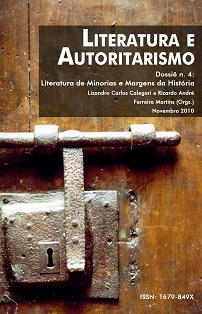Discurso utópico e distópico nas paisagens narrativas de Admirável mundo novo, de Aldous Huxley
DOI:
https://doi.org/10.5902/1679849X74930Keywords:
Aldous Huxley, Literary criticism, Brave New WorldAbstract
The aim of this paper is to present a reading from of Aldoux Huxley’s Brave New World, from the point of view of the concepts of Utopia - an ideal vision of a positive social order, future or present - and Dystopia - negative characterization of an oppressive social order - as similar propositions, both setting a particular vision of the future scenarios. In common, the two terms show the attempt of certain novelists to narrate a social reality ideally organized, whether authoritarian or not. For our analysis, we will seek first to contrast the way the narrator of Brave New World presents the urban and wild reality, seeking perceive the characterization of two dissonant points proposed by Huxley in its depiction of his fictional utopian/dystopian future. Later, we will study the main characters of novel, the civilized Bernard Marx and the savage John Savage, to see how the social reality of them alters their perceptions and their attempts to change their reality. For this, our intent is to analyze the relation between literary art and the different characterizations of utopia or dystopia in Huxley’s novel.
Downloads
References
FREIRE, Roberto; Brito, Fausto. Utopia & Paixão. Rio de Janeiro: Guanabara Loogan, 1991.
HUXLEY, Aldous. Admirável mundo novo. São Paulo: Círculo do Livro, sem data.
ZSCHIRNT, Christiane. Livros. São Paulo: Globo, 2006.
ORWELL, George. 1984. São Paulo: Companhia Editora Nacional, 1979.
Downloads
Published
How to Cite
Issue
Section
License
DECLARAÇÃO DE ORIGINALIDADE E EXCLUSIVIDADE E CESSÃO DE DIREITOS AUTORAIS
Declaro que o presente artigo é original e não foi submetido à publicação em qualquer outro periódico nacional ou internacional, quer seja em parte ou na íntegra. Declaro, ainda, que após publicado pela Literatura e Autoritarismo, ele jamais será submetido a outro periódico. Também tenho ciência que a submissão dos originais à Literatura e Autoritarismo implica transferência dos direitos autorais da publicação digital. A não observância desse compromisso submeterá o infrator a sanções e penas previstas na Lei de Proteção de Direitos Autorais (nº 9610, de 19/02/98).






